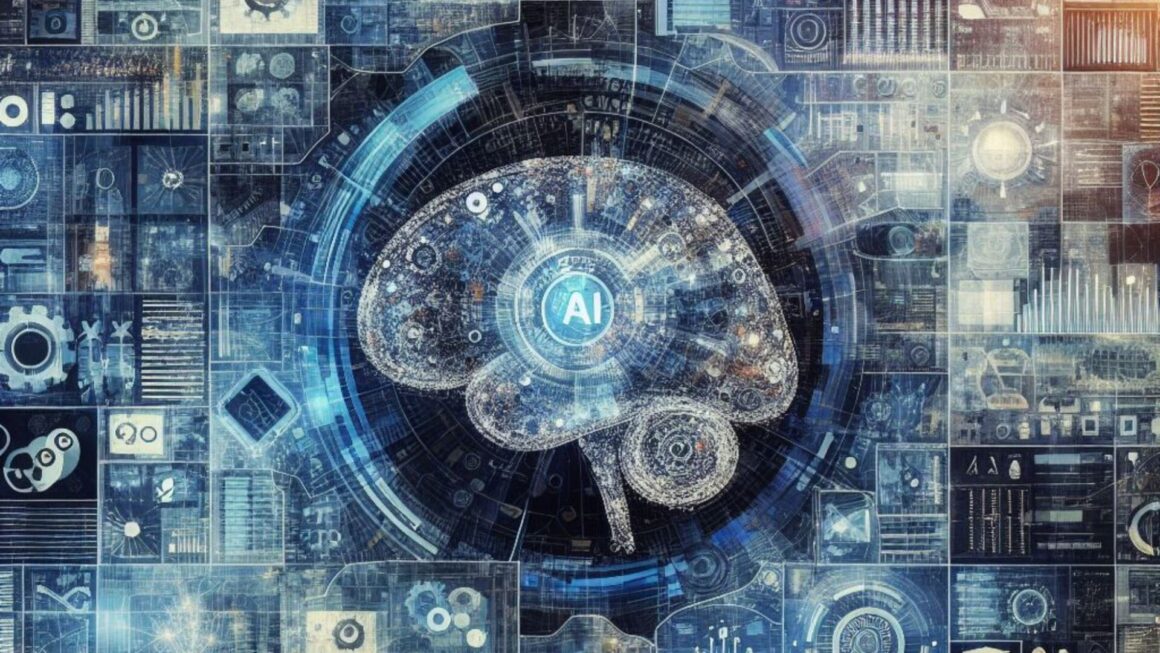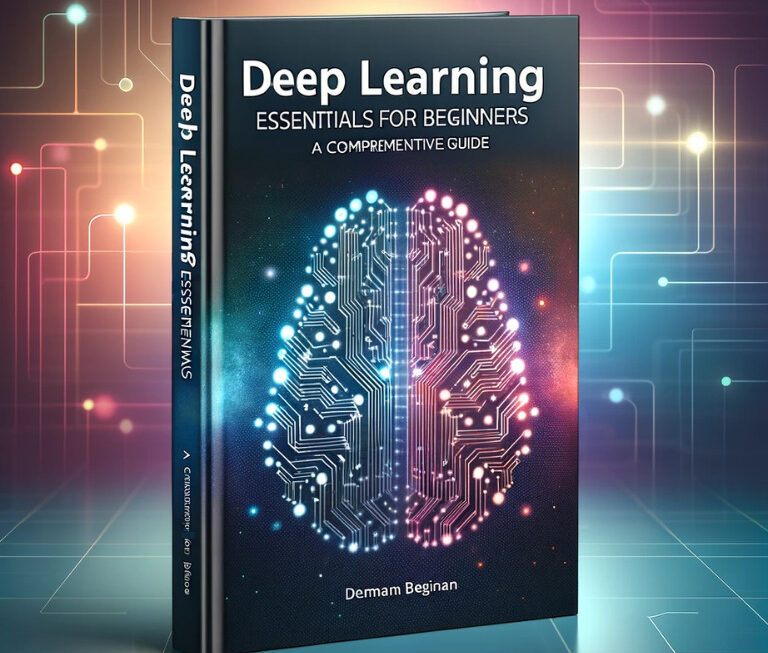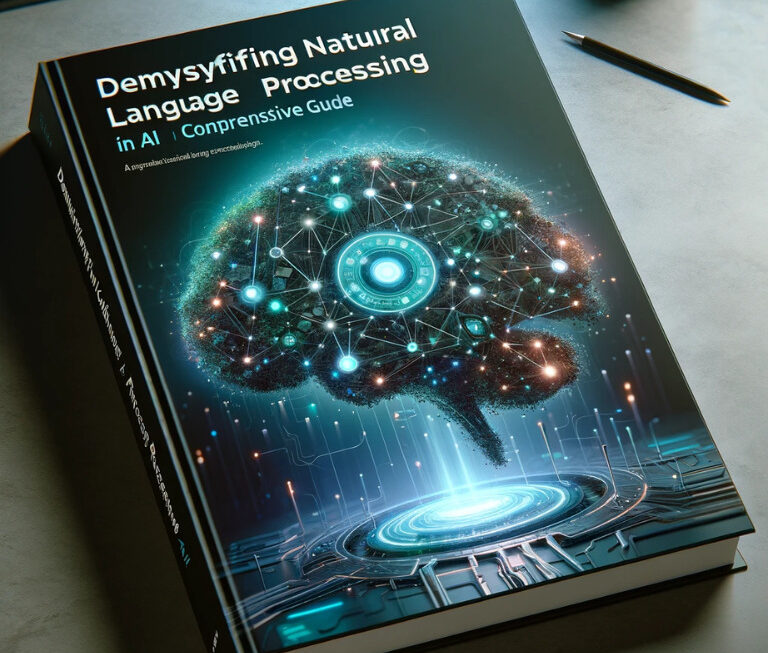The advent of Artificial Intelligence (AI) has ushered in a transformative era for numerous industries, and software development is at the forefront of this revolution. AI’s integration into software engineering is not just a fleeting trend but a fundamental shift in how we conceive, design, and maintain software systems. This section delves into the evolution of AI within the tech sphere and its burgeoning capabilities that are redefining the landscape of software engineering.
The Evolution of AI: From Concept to Core Component
AI’s journey in technology began as a speculative concept, often relegated to the realms of science fiction. However, its transition from theoretical models to practical applications has been nothing short of remarkable. Today, AI is a core component in the developer’s toolkit, offering solutions that were once considered impossible. It’s essential to understand that AI in software development isn’t a single tool or feature; it’s a suite of capabilities that encompasses machine learning, natural language processing, and cognitive computing, among others.
AI’s Capabilities in Software Engineering
AI’s capabilities within software development can be categorized into several key areas:
- Automated Code Generation: AI algorithms can now understand programming languages and generate code snippets, significantly reducing manual coding time and effort.
- Intelligent Debugging: AI systems can sift through code to detect anomalies and bugs that might elude even the most experienced developers.
- Predictive Analytics: By analyzing past data, AI can predict outcomes, helping in project management and decision-making processes.
- Enhanced Testing Procedures: AI-driven testing tools can execute complex test cases and simulate a variety of environments, ensuring software robustness.
- Personalized Developer Assistance: AI-powered virtual assistants can provide real-time guidance and support to developers, enhancing productivity.
The Impact of AI on Software Development Practices
The integration of AI into software development practices has led to a significant shift in the workflow. Traditional coding is often a linear process, but AI introduces a dynamic and iterative approach. Developers are now able to work alongside intelligent systems that can learn from data, adapt to new inputs, and perform tasks with a level of efficiency that humans alone cannot achieve.
For instance, AI-powered code completion tools have become a staple in integrated development environments (IDEs). These tools not only suggest code snippets but also learn from the developer’s coding style, improving their suggestions over time. This personalized assistance is akin to having a co-pilot who not only understands the destination but also helps navigate the journey.
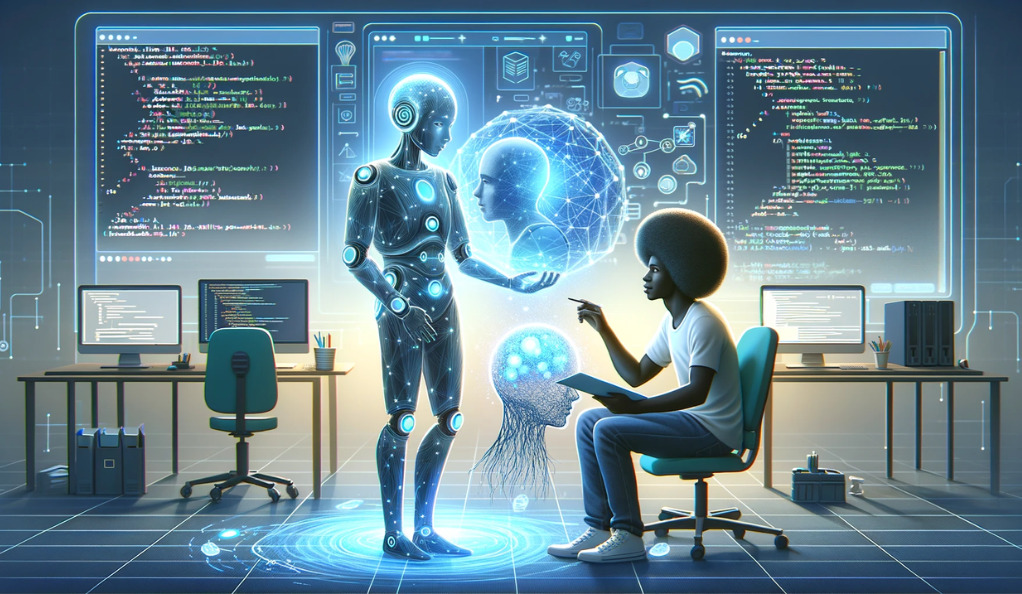
AI’s Role in Software Development Lifecycle (SDLC)
| SDLC Phase | Traditional Approach | AI-Enhanced Approach |
|---|---|---|
| Planning | Manual requirement gathering and feasibility analysis | AI-driven predictive analytics for accurate project scoping |
| Design | Static design frameworks | Dynamic AI models that adapt to changing requirements |
| Coding | Manual coding with occasional reuse of components | Automated code generation and intelligent code reuse |
| Testing | Manual testing with predefined cases | AI-driven dynamic testing with adaptive test cases |
| Deployment | Manual deployment with risk of human error | AI-assisted deployment with predictive error handling |
| Maintenance | Reactive maintenance based on user feedback | Proactive maintenance using AI’s predictive fault detection |
The role of AI in software development is not just an incremental improvement but a paradigm shift. As we continue to explore the depths of AI’s capabilities, it’s clear that the future of software development is one where AI doesn’t replace the developer but rather enhances their abilities, allowing them to focus on innovation and creativity. The symbiosis of human intellect and AI’s computational power is setting the stage for a new era of software development, marked by unprecedented efficiency and groundbreaking advancements.
Automating the Mundane: AI in Code Generation
The landscape of software development is experiencing a seismic shift with the advent of AI-driven code generation. This technology is not about replacing developers but empowering them to focus on more complex and creative aspects of software creation. AI algorithms have been trained on vast datasets of code, enabling them to understand programming languages and generate code snippets, functions, and even entire modules with impressive accuracy.
AI Tools Elevating Coding Efficiency
AI-powered tools like GitHub’s Copilot and JetBrains’ IntelliCode are reshaping the coding experience. These platforms leverage machine learning to offer real-time code suggestions, anticipate developer needs, and automate repetitive coding tasks. For example, Copilot can suggest entire lines or blocks of code, learning from the context provided by the developer’s existing codebase.
Debugging with AI: Beyond Human Precision
Debugging is a critical phase in software development, often consuming a significant portion of a developer’s time. AI’s foray into this domain has been a game-changer, offering tools that can not only detect bugs but also suggest fixes and even implement them autonomously.
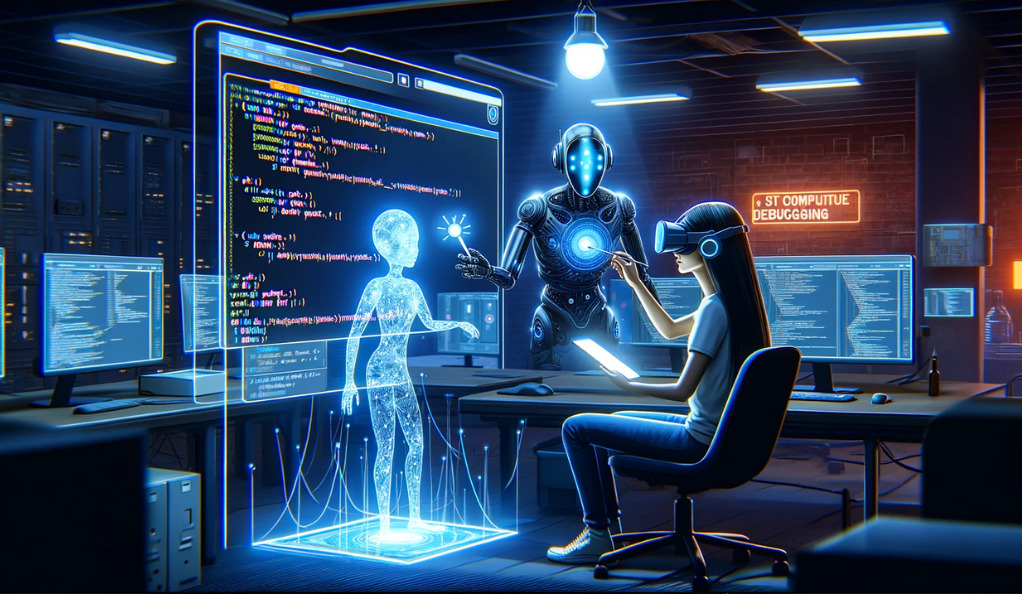
Intelligent Debugging Tools
Tools like DeepCode and Kite harness AI to analyze code repositories, learn from historical bug fixes, and apply this knowledge to identify potential issues in new code. They can scan through millions of lines of code in a fraction of the time it would take a human, with a level of precision that significantly reduces the incidence of bugs slipping into production.
The Ripple Effect of AI in Debugging
The ripple effect of AI in debugging is profound:
- Efficiency: AI can identify bugs early in the development cycle, reducing the cost and effort of fixing them later.
- Reliability: With AI’s help, software becomes more reliable, as even the most elusive bugs are caught.
- Focus: Developers can allocate more time to developing new features rather than fixing bugs.
AI-Powered Testing: Ensuring Software Reliability
AI’s role in software testing is another area where its impact is undeniable. Traditional testing methods, while thorough, can be time-consuming and are often limited to the scenarios anticipated by the test engineers. AI-driven testing tools, however, can execute a broader range of tests, simulate user interactions, and identify edge cases that humans might overlook.
Innovations in Automated Testing
AI innovations in testing are not just about automation but intelligent automation. Tools like Testim and Applitools use AI to adapt tests in real-time, learning from changes in the application and user behavior. This means that as the software evolves, the tests evolve too, ensuring that the software is always meeting the highest quality standards.
The Advantages of AI in Testing
The advantages of AI in testing include:
- Comprehensiveness: AI can cover more test scenarios, including those that are data-intensive or too complex for manual testing.
- Adaptability: AI-driven tests can adjust to changes in the software without needing extensive rewrites.
- Speed: AI can run tests continuously and in parallel, significantly speeding up the testing process.
Enhancing Developer Productivity with AI Assistants
The introduction of AI assistants into the software development process has been a boon for developer productivity. These assistants provide real-time guidance, answer questions, and offer solutions to problems as they arise, acting as a 24/7 support system for developers.
The Balance Between AI Assistance and Human Creativity
While AI provides the computational power to handle routine tasks, it is the human developer who brings creativity to the table. The collaboration between AI and human intelligence results in a more efficient development process and a more innovative end product. AI assistants are not a replacement for human insight but a complement that enhances the developer’s capabilities.

Real-World Impact of AI Assistants
The real-world impact of AI assistants is evident in the stories of developers who have used these tools to overcome complex challenges. For instance, a developer working on an AI-driven logistics application used an AI assistant to optimize routing algorithms, resulting in a 30% reduction in delivery times.
Predictive Analytics in Software Project Management
Predictive analytics powered by AI is revolutionizing software project management. By analyzing historical data, AI can forecast project timelines, budget requirements, and potential roadblocks before they occur, allowing for proactive management of the software development lifecycle.
AI’s Role in Project Planning and Risk Assessment
AI’s predictive capabilities enable more accurate planning and risk assessment. It can identify patterns and trends that may affect project outcomes, such as the likelihood of certain features causing delays or increasing costs. This foresight allows project managers to allocate resources more effectively and avoid common pitfalls.
The Future of Software Development with AI
As AI continues to evolve, its role in software development is set to expand even further. The future may see AI not just assisting with coding and testing but also participating in higher-level decision-making processes. The potential for AI to understand user needs and market trends could lead to a new age of software that is not only functionally robust but also deeply aligned with user expectations.
AI is not just revolutionizing software development; it is redefining it. By automating routine tasks, enhancing developer productivity, and providing insights that were previously unattainable, AI is enabling the creation of software that is more reliable, efficient, and aligned with human needs. As we embrace this new era, the symbiotic relationship between developers and AI will become the cornerstone of innovation in the software industry.
User-Centric Software: AI’s Real-Time Feedback Integration
The development of user-centric software hinges on understanding and responding to user feedback. AI excels in this area by providing developers with the tools to gather and analyze feedback in real-time. This immediate insight allows for swift iterations and enhancements, ensuring that the software not only meets but exceeds user expectations.
Leveraging AI for Enhanced User Experience
AI algorithms can sift through vast amounts of user interaction data to identify patterns and preferences. This capability enables developers to tailor the user experience to individual needs. For instance, AI can analyze user behavior to suggest personalized features or detect usability issues that might not be evident without deep data analysis.
Real-Time Adaptation to User Feedback
The ability to adapt to user feedback in real-time is a significant advantage that AI brings to software development. Machine learning models can continuously learn from how users interact with software, leading to a dynamic development process where user feedback directly influences the evolution of the application.
High-Quality Code Compiler
AI is not only revolutionizing the way code is written and tested but also how it is compiled. High-quality AI code compilers can optimize the compilation process, ensuring that the software runs efficiently on the intended platforms.
AI-Enhanced Compilation for Performance Optimization
AI-enhanced compilers can make intelligent decisions about code optimization, often leading to performance improvements that manual optimization might miss. These compilers analyze the codebase and make real-time adjustments during the compilation process, resulting in faster and more reliable software.
The Future of AI Code Compilers
Looking ahead, AI code compilers are set to become even more sophisticated, with the potential to revolutionize the way software is deployed. They could offer predictive analysis of how code changes will affect performance across different environments, leading to a more streamlined deployment process.
The Future of Software Development with AI
The future of software development is inextricably linked with the advancements in AI. As AI technologies become more integrated into the development process, we can expect to see software that is not only developed faster but also with greater intelligence and adaptability.
Predictions for AI’s Growing Role
Predictions for the future role of AI in software development include:
- Autonomous Software Creation: AI may one day be capable of creating software independently, using natural language inputs to generate code.
- Intelligent Project Management: AI could manage entire projects, allocating resources and scheduling tasks without human intervention.
- Enhanced Security: AI’s ability to predict and respond to security threats could lead to software that is inherently more secure.
Ethical Considerations and the Future of Human Developers
As AI takes on a more significant role in software development, ethical considerations must be addressed. The potential for AI to impact employment in the sector is a concern, as is the need for transparency in AI-driven decisions. However, the future is not one of human obsolescence but rather human-AI collaboration, where the strengths of both are leveraged to achieve more than either could alone.
Conclusion
AI’s impact on software development is profound and far-reaching. From automating the mundane to enhancing the creative, AI is not just a tool but a partner in the development process. As we look to the future, the integration of AI in software development promises a landscape of innovation, efficiency, and unprecedented technological synergy. The revolution is not coming; it is already here, and it is AI that is leading the charge.


